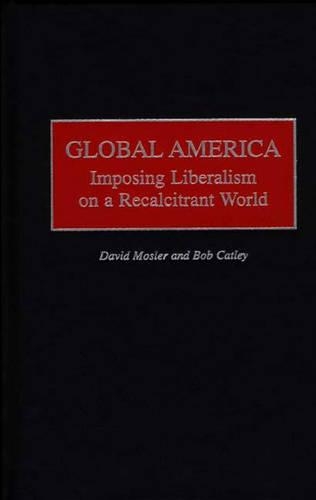
Global America: Imposing Liberalism on a Recalcitrant World
(Hardback)
Publishing Details
Global America: Imposing Liberalism on a Recalcitrant World
By (Author) Robert Catley
By (author) David Mosler
Bloomsbury Publishing PLC
Praeger Publishers Inc
30th July 2000
United States
Classifications
Tertiary Education
Non Fiction
African history
Globalization
327.73
Physical Properties
Hardback
240
Description
Mosler and Catley examine the rise of the United States to the status of a great power by the beginning of the 20th century, its maturation as a superpower during the co-dominion of the Cold War, and its emergence as a hegemonic power after the collapse of the Soviet Union. As a hegemon it has pursued the globalization of a liberal world order. The key institutions and characteristics of the United States which enable it to become a hegemonic power, are examined as indicators of its likely behavior as a dominant power in the 21st century. The evolution of the liberal international political and economic order pursued by the United States since World War One and established by the Bretton Woods Conference of 1944 is examined in the context of the global meltdown of the late 1990s. The role of the United States in the creation of the system that we now call globalization is scrutinized and its development into the next century is anticipated. In their final section, Mosler and Catley analyze the possible challenges to the United States as a hegemonic power in the 21st century and the prospects for war and peace and social and economic development in the new millennium. This is an important analysis for scholars, researchers, policymakers, and concerned citizens interested in international relations and American foreign policy.
Reviews
.,."brief but well done....the book is helpful as a reminder that US hegemony rests not only on the nation's power, but on its determination to change the rules of the pre-1945 international game so the world will become more open, and especially more open to US hegemonic influence."-The International History Review
...brief but well done....the book is helpful as a reminder that US hegemony rests not only on the nation's power, but on its determination to change the rules of the pre-1945 international game so the world will become more open, and especially more open to US hegemonic influence.-The International History Review
The authors put together a wide-ranging discussion of the US's past, present, and future role in the international system. As such, it is a good introduction to students unversed in the topic. Undergraduates.-Choice
"The authors put together a wide-ranging discussion of the US's past, present, and future role in the international system. As such, it is a good introduction to students unversed in the topic. Undergraduates."-Choice
..."brief but well done....the book is helpful as a reminder that US hegemony rests not only on the nation's power, but on its determination to change the rules of the pre-1945 international game so the world will become more open, and especially more open to US hegemonic influence."-The International History Review
Author Bio
DAVID MOSLER is a Senior Lecturer in American History at the University of Adelaide. He has written widely on American history and politics. His latest book, with Bob Catley, was America and Americans in Australia (Praeger, 1998). BOB CATLEY is the Convenor of International Politics at the University of Adelaide. He is now Professor and Chairman of Department, Political Studies, University of Otago, Dunedin, New Zealand. A former politician and government official, he has written ten earlier books.
